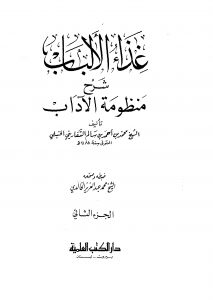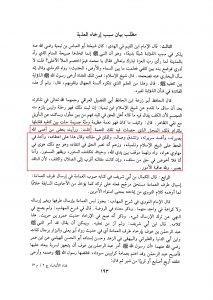as-Saffarini’s befitting response to Ibn Hajar Makki’s slander against Ibn Taymiyyah.
He is Abul ‘Awn Sham ud Din Muhammed bin Ahmed bin Salim As-Saffarini (1114 h to 1188 h).
He mentioned exactly what Ibn Hajar mentioned about a dream of Prophet peace be upon him which was quoted by Ibn al Qayyim from Ibn Taymiyah which states that:
The Prophet Muhammad (sallallahu ‘alaihi wa sallam) had let down a part of his turban to mark the spot between his shoulders that God had touched with His hand. Then Ibn Hajar accused Ibn Taymiyah for Tajseem.
as-Saffarini did not even bothered to take Ibn Hajar’s name and said:
قلت : ورأيت بعض من أعمى الله بصيرته ، وأفسد سريرته ، وتشدق وصال ، ولقلق في مقالته وقال هذا على اعتقاده ، وأخذ في الحط على شيخ الإسلام وتلميذه ، وزعم أنه نصر الحق في انتقاده ، وهو مع ذلك هوى في مهاوي هواه ، وله ولهما موقف بين يدي الله ، وحينئذ تنكشف الستور ، ويظهر المستور .
وأما أنا فلا أخوض في حق من سلف ، وإن كانت مقالته أقرب إلى الضلال والتلف ، لأن الناقد بصير .
ولله عاقبة الأمور . .
Urdu Translation
میں نے بعض لوگوں کو دیکھا کہ جنکی آنکھوں کو اللہ نے اندھا کردیا، اور انکے باطن کو برباد کردیا، اور اس نے زبان چلائی، سوچیں سمجھیں بغیر بولنے لگا، اور یہ سب اس نے اپنے عقیدے کے مطابق کیا، اور ابن تیمیہ اور انکے شاگرد پر تنقید کی، اور یہ سوچنے لگا کہ وہ حق کی مدد کر رہا اپنی اس تنقید میں اور اسکے باوجود وپ خواہیشات کی وادیوں میں ہلاک ہوگیا،، اور اس شکص کو اور ان دونوں مشائخ کو اللہ کے سامنے ایک دن کھڑا ہونا ہے بس اس دن راز کھل جائنگے، اور چھپی ہوئی باتیں سامنے آجائنگی،۔
البتہ میں ان لوگوں کے بارے میں یہ غور نہیں کرتا جو گذرچکے ہیں، اگر چہ انکی بات گمراہی اور باطل سے قريب ہی ہو،
English Translation
I have seen in someone’s (writings) whose eyes were blinded by Allah and (Allah) spoiled his inner self. He ranted and spoke without even thinking. He said it due to his aqeeda and degraded Shaykh al Islam (Ibn Taymiyah) and his student (Ibn al Qayyim). He thought he is helping the truth in his refutation, but actually he killed himself in the valley of his desires. He (Ibn Hajar) and the two Shaykhs (Ibn Taymiyah and Ibn al Qayyim) will stand in front of Allah one day andthat day all the secrets will be opened and hidden things will come out.
I (as-Saffarini) do not think about those who passed away even though their sayings are misguided and false. [غذاء الألباب شرح منظومة الآداب ج2 ص ١٩٣]


Before him Ibraheem al Korani the Ashari and Mulla Ali al Qari the Matureedi also responded to Ibn Hajar`s Slanders.
For example, Mulla Ali al Qari said
فالطعن الشنيع والتقبيح الفظيع غير موجه عليه ولا متوجه إليه، فإن كلامه بعينه مطابق لما قاله الإمام الأعظم، والمجتهد الأقدم في فقهه الأكبر
This heinous, ugly and worst slander (of Ibn Hajar) should not be looked upon and his (Ibn Taymiyah’s) saying is exactly like the saying of Imam al Adham and al Mujtahid (Abu Hanifa) as mentioned in Fiqh al Akbar. [Its funny that this quote is present on the same page where al Munawi defended Ibn Taymiyah i,e, Mulla ‘Ali al-Qari’s Sharh on the Shumail (1/169)].
